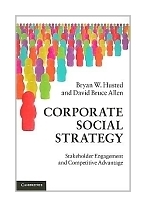|
||
• wydawnictwa polskie
• Zamów informacje o nowościach z wybranego tematu • kontakt
• Cookies na stronie |
CORPORATE SOCIAL STRATEGYHUSTED B.W. ALLEN D.wydawnictwo: CAMBRIDGE , rok wydania 2010, wydanie Icena netto: Can good-will be good business? Firms are increasingly called upon to address matters such as poverty and human rights violations. The demand for corporate social responsibility (CSR) is directed mainly at top management in multinational corporations who are reminded that, in addition to helping to make the world a better place, their commitment to social action will be rewarded by lasting customer loyalty and profits. But is it true that firms that engage in social action will be rewarded with a good name, competitive advantage, superior profits and corporate sustainability? What if it is true for some firms and not for others? This book addresses these and other questions by explaining the how and why of creating value and competitive advantage through corporate social action. It shows how and when firms can develop successful corporate social strategies that establish strong commitments to shareholders, employees and other stakeholders. Bryan W. Husted holds the Erivan K. Haub Chair in Business and Sustainability at the Schulich School of Business, York University, Canada, and is Professor of Management at the EGADE Business School of the Tecnológico de Monterrey in Mexico. For many years, he held the Alumni Association Chair in Business Ethics and Corporate Sustainability at the Instituto de Empresa in Spain. He is currently a national researcher (level II) of the National Research System (SNI) of Mexico. David Bruce Allen is Professor of Strategy and Co-Director of the Center for Nonmarket Strategy at IE Business School in Madrid, Spain, where he served as Vice Dean for Research and Chair of the Strategy Department. Professor Allen has held top management positions in the movie, publishing, and consulting industries. He is a former Fulbright Lecturer in Spain and Resident Filmmaker at the Sundance Institute and has published fiction and criticism. He has taught at the City University of New York, Boston University, and the University of New Orleans. Table of Contents List of figures; List of tables; List of appendices; Acknowledgments; 1. Introduction: corporate social strategy; Part I. Fundamentals: 2. The ethics of social strategy; 3. Theory of the firm and corporate social strategy; 4. Overview of the model: how do we build corporate social strategy?; 5. Elements of successful corporate social strategy; Part II. The Process of Developing Corporate Social Strategy: 6. Competitive environment; 7. From stakeholder management to social strategy; 8. Resources and capabilities; 9. Corporate identity; Part III. Implementing Social Strategy: 10. Organizing for social strategy; 11. Corporate social strategy management and the multinational company; 12. Measurement and evaluation; 13. Conclusions: the future of social strategy; Bibliography; Index. 362 pages, Paperback Księgarnia nie działa. Nie odpowiadamy na pytania i nie realizujemy zamówien. Do odwolania !. |


